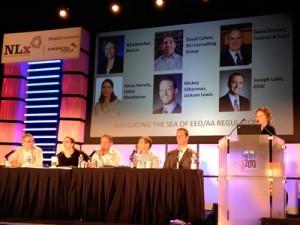As many know, 2013 will be a pivotal year in terms of EEO and affirmative action compliance. To help get a grip on the proposed regulatory changes, human resource professionals, as well as representatives from the Office of Federal Contractor Compliance Programs (OFCCP) and Equal Employment Opportunity Commission (EEOC), traveled to Indianapolis to attend the 31st Annual Industry Liaison Group (ILG) National Conference to raise their compliance game and discuss the changes on the horizon.

Takeaway #1: Know the New Rules and Play By those Rules
Mickey Silberman, Jackson Lewis LLP
As a Managing Partner of Jackson Lewis LLP’s Denver, Colorado office, Mickey Silberman works exclusively in employment law. To begin, he asked the audience to take a moment and backtrack, so he could illustrate his point. Mickey stated that during administration changes, a vision for the agency is created and with that vision comes goals of what they’d like to accomplish. With the Obama administration, no changes in regulations or directives were made during their first term – meaning the OFCCP was “playing with a playbook that wasn’t theirs”. Once the new regulations and directives are approved, the administration will then be enforcing rules that they created. Mickey adamantly stated he feels employers will see an emboldened agency and they need to be prepared – therefore, read the rules, know the rules and make adjustments to your operations as needed.
Takeaway #2: Manage Your Audit, Don’t Let Your Audit Manage You
David Cohen, DCI Consulting Group
As a recognized national EEO and affirmative action compliance expert, David Cohen was able to speak to his encounters with the OFCCP. He explained that the OFCCP has recently hired new officers and while they are getting up to speed, employers are already seeing massive data requests due in a short timeframe. With these massive data requests, the best way to work with the OFCCP is to negotiate the terms saying, “Here’s what I can get you and here’s what I can’t get you within that timeframe.” David also emphasized managing your audit and/or expediting the audit process by building a relationship with your compliance officer. That way when you get a request from the OFCCP, they will be more willing to work with you due to the rapport you’ve built with them.
Takeaway #3: Changes Taking Place Will Fundamentally Alter How Compliance Will Be Practiced
Joseph Lakis, Equal Employment Advisory Council (EEAC)

Takeaway #4: Be Proactive and Get Ahead of Audits Now
Alissa Horvitz, Littler Mendelson, P.C.
As co-chair of Littler Mendelson’s Office of Federal Contract Compliance Programs (OFCCP) Practice Group, Alissa Horvitz exhibits unrivaled knowledge and passion when helping employers with audit preparation, as well as other OFCCP dealings. During her presentation, Alissa displayed slide after slide of information that is now being requested from the OFCCP. During that time she stated that along with the excessive information requests, employers are being given five days to pull together information to satisfy the requests. Her best advice to employers was to gather the various segments of your department and begin communicating better. She suggested that each attendee go back to their office, gather their various department heads and get together to see what they are currently tracking and what they aren’t, that way they can be proactive and get ahead of potential audits that could occur. She also was a proponent for self-audits and said employers should closely examine each of their facilities before the OFCCP has a chance to.
Takeaway #5: Plan for a Compliance Budget Increase of at Least 25%
David Fortney, Fortney & Scott, LLC.
With great familiarity in the realm of employment law, David Fortney agreed with each of the panelists and then added that compliance practitioners should allot for at least a 25% budgetary increase in their spending. He commented that relationships between federal contractors and the OFCCP are at an all-time low –meaning there is much less coordination, collaboration and cooperation happening between the two parties. With this huge disconnect happening, David remarked that it’s probably going to get worse before it gets better.

While opinions varied per panelist, they all agreed that employers need to be proactive and prepared for the impending EEO and AA regulatory changes, and we couldn’t agree more. How many of our Members are taking the offensive route and preparing before the regulatory changes are implemented? Please let us know by commenting below!
